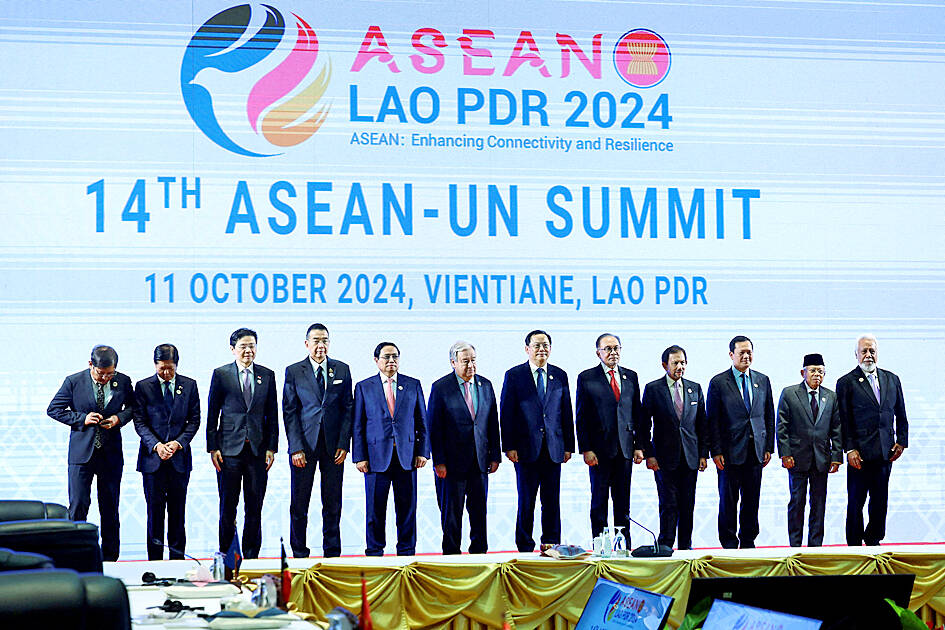Southeast Asian leaders yesterday called for swift agreement on a code of conduct for the South China Sea based on international law, while demanding an immediate halt to fighting in Myanmar and inclusive peace talks to end its civil war.
The ASEAN chairman’s statement represents the consensus from meetings ended on Friday of the 10 member nations in Laos, which included diplomats from the US, Russia, China, Japan, India and South Korea.
Confrontations have been rising in disputed waters of the South China Sea between China, which claims sovereignty over almost all of the vital waterway, and ASEAN members including the Philippines and more recently Vietnam.

Photo: Reuters
The rows have raised risks of an escalation that could eventually involve the US, which is bound by treaty to defend the Philippines if it is attacked.
The sea, where US$3 trillion worth of trade passes annually, has been a major point of contention at the ASEAN meetings, particularly with Russia and China objecting to a reference to the 1982 UN Convention on the Law of the Sea, a US official said on Saturday.
The ASEAN statement called for confidence-building measures that could “reduce tensions and the risk of accidents, misunderstandings and miscalculation” in the South China Sea.
It cited “positive momentum” in talks on a maritime code that could help settle disputes. China and ASEAN agreed on this in 2002, but the formal process of creating one did not start until 2017.
The bloc “looked forward to the early conclusion of an effective and substantive” code of conduct that is “in accordance with international law,” including the UN convention, the statement said.
On Myanmar’s spiraling war, ASEAN called for “an immediate cessation” of violence and the creation of a “conducive environment for the delivery of humanitarian assistance and inclusive national dialogue” that is “Myanmar-owned and -led.”
The war between ASEAN member Myanmar’s military government and an expanding armed resistance is a major concern for the bloc, which has made little progress on a five-point peace plan, unveiled months after the 2021 coup that brought the junta to power.
About 18.6 million people, more than a third of Myanmar’s population, are estimated to need humanitarian assistance.
ASEAN welcomed Thailand’s initiative to host informal talks on Myanmar, possibly joined by other ASEAN members, later this year.
Meanwhile, the US official said that Russia and China blocked a proposed consensus statement for the East Asia Summit drafted by ASEAN, mainly over objections to language on the contested South China Sea.
The statement arrived at by consensus by ASEAN was put to the 18-nation East Asia Summit meeting in Laos on Thursday evening, the official said.
“ASEAN presented this final draft and said that, essentially, this was a take-it-or-leave-it draft,” the official said on condition of anonymity.
The US, Japan, Australia, South Korea and India all said they could support it, the official said, adding that “the Russians and the Chinese said that they could not and would not proceed with a statement.”

The CIA has a message for Chinese government officials worried about their place in Chinese President Xi Jinping’s (習近平) government: Come work with us. The agency released two Mandarin-language videos on social media on Thursday inviting disgruntled officials to contact the CIA. The recruitment videos posted on YouTube and X racked up more than 5 million views combined in their first day. The outreach comes as CIA Director John Ratcliffe has vowed to boost the agency’s use of intelligence from human sources and its focus on China, which has recently targeted US officials with its own espionage operations. The videos are “aimed at

STEADFAST FRIEND: The bills encourage increased Taiwan-US engagement and address China’s distortion of UN Resolution 2758 to isolate Taiwan internationally The Presidential Office yesterday thanked the US House of Representatives for unanimously passing two Taiwan-related bills highlighting its solid support for Taiwan’s democracy and global participation, and for deepening bilateral relations. One of the bills, the Taiwan Assurance Implementation Act, requires the US Department of State to periodically review its guidelines for engagement with Taiwan, and report to the US Congress on the guidelines and plans to lift self-imposed limitations on US-Taiwan engagement. The other bill is the Taiwan International Solidarity Act, which clarifies that UN Resolution 2758 does not address the issue of the representation of Taiwan or its people in

US Indo-Pacific Commander Admiral Samuel Paparo on Friday expressed concern over the rate at which China is diversifying its military exercises, the Financial Times (FT) reported on Saturday. “The rates of change on the depth and breadth of their exercises is the one non-linear effect that I’ve seen in the last year that wakes me up at night or keeps me up at night,” Paparo was quoted by FT as saying while attending the annual Sedona Forum at the McCain Institute in Arizona. Paparo also expressed concern over the speed with which China was expanding its military. While the US

SHIFT: Taiwan’s better-than-expected first-quarter GDP and signs of weakness in the US have driven global capital back to emerging markets, the central bank head said The central bank yesterday blamed market speculation for the steep rise in the local currency, and urged exporters and financial institutions to stay calm and stop panic sell-offs to avoid hurting their own profitability. The nation’s top monetary policymaker said that it would step in, if necessary, to maintain order and stability in the foreign exchange market. The remarks came as the NT dollar yesterday closed up NT$0.919 to NT$30.145 against the US dollar in Taipei trading, after rising as high as NT$29.59 in intraday trading. The local currency has surged 5.85 percent against the greenback over the past two sessions, central